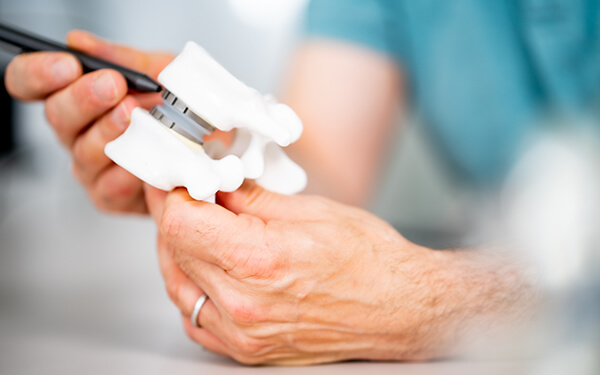
Artificial Disc Replacement
In the case of sudden and intense pain in the back area, the worst-case scenario may have occurred – there is a herniated disc. If back pain suddenly arises, radiating pain impulses into arms or legs, caution is advised. Other symptoms of a herniated disc include sensations such as tingling, numbness, and up to complete muscle paralysis. Reflexes are only slightly diminished or even completely turned off.
Artificial Disc Replacement – Movement instead of Fusion thanks to Disc Surgery
Once the diagnosis of a herniated disc is made, the question of the right therapy arises. If the disc is so severely damaged by the herniation that normal daily activities and overall mobility are limited, disc surgery is an option to improve the patient’s health. Artificial disc replacement is a sensible option for surgical procedures, especially if the vertebral bodies are threatening to collapse and the patient’s mobility should be maintained. The use of an artificial disc replacement gives the patient the chance to regain the mobility of their spine after therapy. With an alternative stiffening, the patient must expect a restriction of their mobility and gradually lose mobility.
Stabilization and Protection of Vertebral Bodies through the Right Prosthesis
In Clinic Bel Etage, compensation of a non-intact disc by an artificial disc replacement is carried out only through high-quality implants. These consist of durable titanium plates, filled in the middle with titanium foam. In order to match the function of a natural disc, both of these plates are movable and generally grow together with the vertebral body within three weeks after the disc surgery. Through the design of these implants, the pressure on the vertebral bodies is perfectly cushioned, allowing excellent mobility.



Cause of a Herniated Disc
Incorrect movements while playing tennis, excessive physical labor, long-term wear and tear, and shocks to the spine are typical triggers for a herniated disc. Continuous pressure or jerky movements squeeze or injure the disc between our vertebral joints, causing the tissue to leak out and press on a neighboring nerve or the nerve root. The pain sets in immediately and the mobility of the affected person is greatly reduced.
What Happens in an Intervertebral Disc Defect?
The discs in our spine connect our joints and allow us a wide range of mobility. In the case of a herniated disc, tissue is released from the jelly nucleus and penetrates the fiber nucleus of the disc. The leaked tissue then applies pressure to nerves or the nerve root, resulting in a strong pain impulse.



